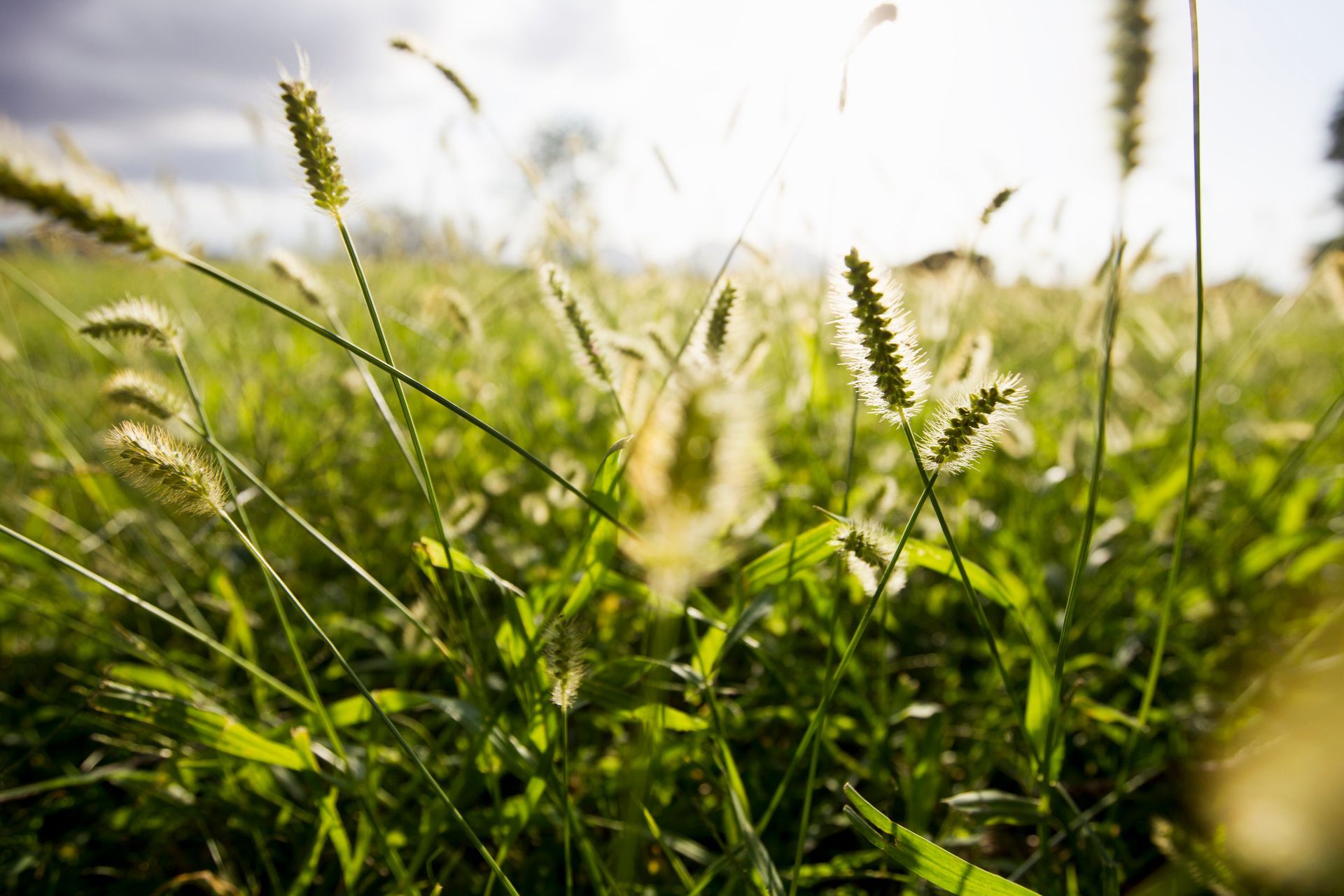Summer is just around the corner, and Texans are gearing up for a season packed with BBQs, hiking, biking, camping, and music festivals. But for those with allergic rhinitis in San Antonio, the palpable excitement in the air gets clouded by a familiar dread—grass allergies. As May and June roll in, so do skyrocketing pollen levels, turning your planned outdoor adventure into a sneezy disaster.
But here’s the silver lining: just as you pull weeds out by the roots to keep your garden flourishing, you must tackle grass allergies at the core to promote lasting relief. At Apex Allergy and Asthma Clinic, we’re here to help you do just that, ensuring you can savor every moment of the sunny season without the burden of allergies.
Blow grass allergies out of your life! Find profound, long-term relief at Apex Allergy and Asthma Clinic.
What Causes Grass Allergies in Texas?
Grass allergies, a common trigger of allergic rhinitis, occur when your immune system mistakes grass pollen for a harmful substance and overreacts to it. In Texas, several factors contribute to the high incidence of grass allergies. The first and most obvious reason is that Texas is home to a number of grasses that produce allergenic pollen.
Common Grass Pollens in Texas
Not all grasses produce pollen that can trigger allergies. Only a few of them do, such as:
- Bermuda Grass
Prevalent in Texas lawns and sports fields, Bermuda grass contributes significantly to the abundance of allergenic pollen in late spring and summer.
2. Johnson Grass
Often found along roadsides and in fields, Johnson grass typically unleashes its allergenic payload during the late spring and early summer months, peaking in May and June.
3. Ryegrass
Common in winter lawns and pastures, ryegrass typically reaches its highest levels in late spring to early summer, usually around May and June in temperate regions.
San Antonio’s Climate
Grass allergies may significantly worsen due to San Antonio’s warm and humid climate, especially during the warmer months. These favorable conditions increase pollen production and dispersal, extending the pollen season well into summer.
The prolonged presence of pollen leads to more exposure, exacerbating symptoms for allergy sufferers across the city. In addition, coexisting allergens such as tree pollen and mold spores further complicate symptom management. This challenging environment necessitates tailored strategies to promote relief for those with grass allergies.
Pinpointing the specific grass responsible for allergic reactions becomes even more complex in such diverse conditions, but an allergist in Texas can help zero in on the root cause and provide the appropriate treatment. An allergy specialist in San Antonio, like
Dr. Stahl at Apex Allergy & Asthma, knows the city’s unique environmental factors, ensuring effective management of local grass allergies.
What Are the Best Treatments for Grass Allergies?
Immediate Relief Solutions
When
allergic rhinitis symptoms strike, many find quick relief in over-the-counter (OTC) options. The most common fast-acting solutions for allergic rhinitis symptoms are:
Drugs such as cetirizine and loratadine prevent histamine, the symptom-causing substance your body produces during an allergic response. These meds can reduce sneezing, itching, and runny noses.
Saline sprays can wash out allergens from your nasal passages, while steroid nasal sprays (like fluticasone) reduce inflammation and relieve congestion.
Though effective, these treatments offer only temporary relief and do not address the underlying cause of your allergies. If your symptoms persist, consult
an allergy specialist for more effective treatment options.
Prescription Medications
Severe symptoms often require prescription medications, which may include:
- Stronger Antihistamines
- Leukotriene Receptor Antagonists
- Corticosteroids
While helpful, these medications primarily address symptoms on the spot rather than promote long-term relief.
Long-Term Treatment: Immunotherapy
Immunotherapy stands out as a long-term treatment for grass and other allergies. Unlike medications, immunotherapy tackles the root cause of allergies by slowly making the immune system less sensitive to allergens.
How Immunotherapy Works
Immunotherapy for allergies involves regular exposure to small, controlled amounts of the allergen that causes your symptoms. Over time, this exposure helps your immune system become less sensitive to the allergen, reducing or even eliminating your allergic reactions. This process requires commitment and consistency but offers lasting relief and can significantly improve your quality of life.
Types of Immunotherapy
- Subcutaneous Immunotherapy (SCIT)
Commonly known as allergy shots, SCIT involves injecting small amounts of allergens into the skin. Our team administers this method in a controlled setting at our
San Antonio allergy clinic.
Treatment typically starts with a build-up phase, where injections are given once or twice weekly for several months. Once we reach the effective dose, we begin the maintenance phase, spacing injections every few weeks.
SCIT is highly effective and can significantly reduce symptoms. It treats a broad range of allergens, making it suitable for those with multiple allergies.
2. Sublingual Immunotherapy (SLIT)
SLIT involves placing allergen extracts under your tongue in the form of tablets or drops. This method is needle-free and can be done at home after an
allergy specialist in San Antonio supervises the initial doses.
Like SCIT, SLIT starts with a build-up phase where the dosage gradually increases. Daily treatment continues through a maintenance phase, usually lasting several years.
SLIT offers a convenient alternative for those who prefer to avoid injections. It’s particularly effective for treating singular allergens like grass pollen.
Why Immunotherapy?
Immunotherapy reduces symptoms and can modify the natural course of allergies. This means fewer symptoms after stopping the treatment, unlike medications, which only provide temporary relief as long as you take them. Many individuals who have been treated with immunotherapy in our clinic have noticed a substantial enhancement in their lifestyle, breathing easier and enjoying the outdoors like never before.
How to Start Your Immunotherapy Journey
Step 1: Schedule an Initial Consultation
Your journey toward conquering grass allergies begins with an initial consultation at our San Antonio allergy clinic. During this comprehensive visit, our allergy specialists will:
- Review your medical history.
- Conduct
allergy testing.
- Discuss your symptoms in detail.
Step 2: Develop a Customized Immunotherapy Plan
We'll create a personalized immunotherapy plan based on the information gathered during your consultation. This plan outlines:
- Treatment Type
- Dosage and Schedule
- Expected Timeline
Step 3: Begin Your Immunotherapy Treatment
Once your plan is in place, treatment begins. You will go through the following stages:
- Initial Phase (or “Build-up”)
- Maintenance Phase
Step 4: Follow Up and Track Progress
Consistent follow-ups are crucial to the success of your immunotherapy journey. During these appointments, your allergist will:
- Monitor your progress.
- Adjust treatment protocols.
- Provide support and guidance.
Step 5: Achieve Long-Term Allergy Relief
With commitment and regular follow-ups, many patients experience significant, long-term relief from grass allergies. Imagine enjoying outdoor activities in San Antonio without constantly struggling with a runny nose and itchy eyes—which you will soon experience through immunotherapy. Start transforming your quality of life today and live more freely under the Texan sun.
Take the First Step Toward Allergy Relief Today!
Grass allergies have taken control of your life long enough. With effective immunotherapy solutions, you can enjoy the outdoors without the discomfort of grass allergy symptoms. Our San Antonio allergy clinic,
Apex Allergy and Asthma Clinic, offers expert care, tailored treatments, and a community-focused approach to help you conquer grass allergies. Don’t let allergies hold you back any longer.
Ready to cut your allergy at the roots? Call us at 210-490-2051 or click the “Schedule Today” button to start your journey to lasting relief.








